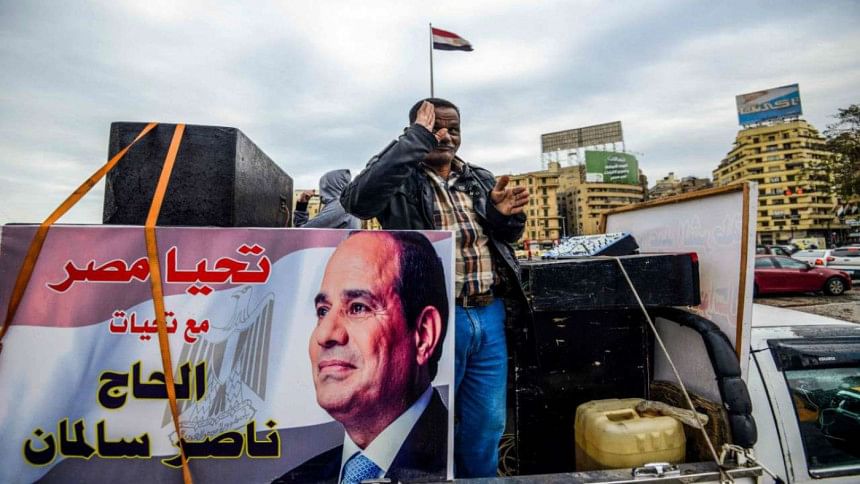Making the safe choice

Egypt re-elected Abdel Fattah al-Sisi as president for another four-year term on March 28, 2018. The result of the election was foregone. Sisi has been accused of sidelining or intimidating several powerful candidates, leaving only another candidate in the race. According to the results, Sisi won 92 percent of the votes cast. Out of 60 million voters, only 41.5 percent cast their ballot which is far less than half the total voters. The only other little known candidate Moussa Mostafa Moussa got less than 10 percent votes.
Egypt has traditionally been ruled by the army since the days of Gamal Nasser (1954) followed by Anwar Sadat (1970) and Hosni Mubarak (1981). For Egyptians President Sisi is not an aberration but the norm. Egyptians are proud of their army and see the army as the saviour of the country. Maintaining stability in the country is of utmost importance to the army generals, rather than establishing a democratic process of governance. The unforgiving western media, insensitive to local political dynamics, has castigated Sisi for stifling democracy in Egypt. In order to appreciate the current state of affairs in this Afro-Asian nation one has to look at the period of Arab Spring, which brings two aspects to this election—internal and regional.
Within the army officers' corps the contest to get to the top is a natural phenomenon. Understandably, Sisi as the incumbent president used his authority and powers to set aside all challenges to his position. Sisi apparently did not want to make this election a one-horse race. Thus the other candidate was allowed into the fray to give it some respectability.
Internally, Egypt went through traumatic times when the Arab Spring uprising broke out at Tahrir Square in January 2011. The country is still smarting from the effects of the revolution having lost its pre-eminent position in the Arab world.
Gamal Nasser's political opposition to Britain and France and wars with Israel had established him as the firebrand of Arab nationalism. Egypt was seen as the bulwark of Arab politico-military strength given its geo-strategic position, its military strength and its civilisational history. On the other hand, Egypt's geographical closeness to Europe and its relations with the West have helped the growth of liberal secular traditions in society. All these achievements suddenly seemed to have evaporated at Tahrir Square in 2011.
Egypt's Arab Spring experiment with democracy has been a bitter one. The rioters at Tahrir Square wanted ouster of President Hosni Mubarak and free and fair elections for a true democratic government. Multi-party presidential elections were held in May 2012. What they got after Hosni Mubarak's ouster was a Muslim Brotherhood government of Mohammad Morsi. Mohammad Morsi's yearlong (June 2012–July 2013) presidency was a period of total chaos and turmoil, with the economy diving to the lowest point. The Brotherhood through its well-oiled machinery had tried to steer the religiously moderate country towards a "Sharia" based society. As the divided country drifted more and more towards ultra-conservative Salafi Islam, the secular army generals stepped in to overthrow Morsi and stem the country's dive from the brink of total collapse. Morsi is now in jail.
Though the Brotherhood is banned in Egypt its spectre continues to destabilise Sisi's government through its regular attacks on the security forces and mosques in Sinai. Another strategy of the Muslim Brotherhood is to frequently attack the Christian churches. These attacks have already cost over a thousand lives over the past four years.
On the regional front, Egypt is surrounded by an extremely unstable neighbourhood. It is under pressure because of the wars that are ongoing in Syria and Yemen, and the deeply precarious security situation in Libya. The realignment of forces in the greater Middle East—blockage of Qatar, Iran's threat, Saudi Arabia's aggressive role in the region, and Turkey's increasing involvement in Arab affairs—has added to Cairo's trepidation. Above all the extreme regional tension with Israel, following President Donald Trump's audacious declaration over Jerusalem, has made it imperative for Sisi to maintain stability in Egypt.
Not surprisingly, this election has revealed the apathy of the majority of people to the election process. At least the voter turnout says so. In 2014 the turnout was 47 percent. Certainly the election was not a popularity contest for Sisi. It was actually an exercise to legitimise the rule of Sisi who seized power in 2013. What's curious is that the National Election Authority warned that those who did not vote because of any cogent reason will be fined 500 Egyptian pounds. Clearly, Sisi tried to get the approval of the majority of Egyptians.
Interviews of those who went to the polling booths to vote for Sisi reveal that they do not want a return to the days of the Muslim Brotherhood. President Sisi will be faced with formidable challenges during his second term. The most important challenges are elimination of Muslim Brotherhood-organised terrorism in all its forms, turning around the economy and, above all, maintaining stability in the country.
Democracy bears different connotations in different countries. Western capitalist democracy broadly means good governance, accountability and human rights. For authoritarian regimes, democracy means economic development, consolidating the power base of the leader and national political stability. Sisi seems to prefer the latter definition of democracy.
Mahmood Hasan is a former ambassador and secretary of the Bangladesh government.










Comments